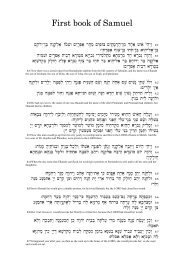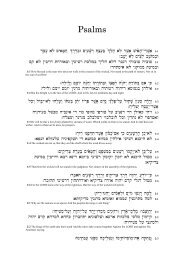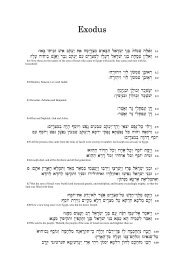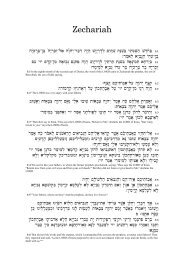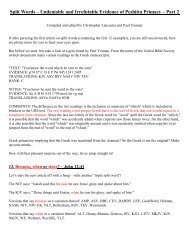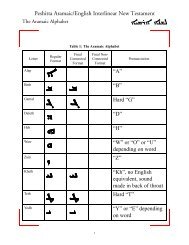- Page 11:
text ana translation Societp presid
- Page 15 and 16:
REMNANTS OF THE LATEK SYKIAC VERSIO
- Page 17 and 18:
768808 GENEBAL PBEFACE THE contents
- Page 19:
REMNANTS OF THE LATER OF THE BIBLE.
- Page 23 and 24:
ACKNOWLEDGMENTS IN the task of coll
- Page 25 and 26:
CONTENTS ADDENDA ET CORRIGENDA . IN
- Page 27:
CONTENTS XI (ii.) Where Greek Text
- Page 30 and 31:
XIV ADDENDA ET CORRIGENDA. Page 62
- Page 33 and 34:
( xvii ) INTRODUCTION SECTION I. Th
- Page 35 and 36:
INTRODUCTION xix editor of the firs
- Page 37 and 38:
INTRODUCTION xxi veniently arranged
- Page 39 and 40:
INTRODUCTION xxiii been preserved.
- Page 41 and 42:
INTRODUCTION xxv versions are not i
- Page 43 and 44:
INTRODUCTION xxvii And in answering
- Page 45 and 46:
INTRODUCTION xxix (our Cod. 1) ; an
- Page 47 and 48:
INTRODUCTION xxxi the Psalter, whic
- Page 49 and 50:
INTRODUCTION xxxiii ing leaves the
- Page 51 and 52:
INTRODUCTION xxxv subsists between
- Page 53 and 54:
INTRODUCTION xxxvii The passages in
- Page 55 and 56:
INTRODUCTION xxxix readings, dSiKov
- Page 57 and 58:
INTRODUCTION xli when we note that
- Page 59 and 60:
INTRODUCTION xliii presented some t
- Page 61 and 62:
INTRODUCTION xlv near Mardin, which
- Page 63 and 64:
INTRODUCTION xlvii preceding, but c
- Page 65 and 66:
INTRODUCTION xlix (apparently a pla
- Page 67 and 68:
INTRODUCTION li raneously, in the l
- Page 69 and 70:
INTRODUCTION liii those of the inte
- Page 71 and 72:
INTRODUCTION Ir now in the Bodleian
- Page 73 and 74:
INTRODUCTION Ivii SECTION XIII. Aut
- Page 75 and 76:
INTRODUCTION lix Krpiov (Jud. 4). O
- Page 77 and 78:
INTRODUCTION Ixi having preserved t
- Page 79 and 80:
INTRODUCTION Ixiii tion, lacking al
- Page 81 and 82:
INTRODUCTION Ixv its own fitness an
- Page 83 and 84:
INTRODUCTION Ixvii SECTION XIX. The
- Page 85 and 86:
INTRODUCTION Ixix then, of tamperin
- Page 87 and 88:
INTRODUCTION Ixxi POSTSCRIPT. The P
- Page 89:
SYRIAC TEXT
- Page 93 and 94:
MANUSCRIPTS CITED. THE Manuscripts
- Page 95 and 96:
MANUSCRIPTS, ETC. '3 Pococke, and 1
- Page 99 and 100:
SUPEESCEIPTIONS, &C. Of our MSS, 1
- Page 101 and 102:
2 PET. I. 1-5] I. *. ~ , Codd. '!-
- Page 103 and 104:
2 PET. I. 9-15] ^ OJCvO^.l K^xiJ^r^
- Page 105 and 106:
2 PET. 1. 19-11. 3] ^ oooi.i *4ii\j
- Page 107 and 108:
2 PET. II. 7-12] ^ o>oi\2M K>Aii\i*
- Page 109 and 110:
2 PET. II. 16-20] ^ csav^i r^i^* 17
- Page 111 and 112:
2 PET. III. 1-5] TB 19 III. 2 ]'^">
- Page 113 and 114:
2 PET. III. 10-16] ^ a>ai.a.i K'&T-
- Page 115 and 116:
2 JOH. 1-4] 23 Codd. 1, 2, 3, 4, 5,
- Page 117 and 118:
2 JOH. 8-12] ^3 t l-A>CU.t rc'^i^nf
- Page 119 and 120:
3 JOH. 1-4} 27 i \ T ( \ CL " /~1 J
- Page 121 and 122:
3 JOH. 10-12] 3 WCU.T K'^ir^ 29 . \
- Page 123 and 124:
JUD. 1-4] 31 .1CCT2-*.! Codd - 1, 2
- Page 125 and 126:
JUD. 7-9] K'.iocn.*.! rc'&iK' 33 ^
- Page 127 and 128:
JUD. 12-15] r^ncioRL*.! T^^T^K' 35
- Page 129 and 130:
JUD. 21-25] rt'iacn.*.! r^mi^r*' 37
- Page 133 and 134:
41 THE PEKICOPE DE ADULTEKA. I. As
- Page 135 and 136:
ST. JOH. VII. 53 VIII. 5] 43 e* * K
- Page 137 and 138:
ST. JOB. VIII. 11, 12] ^cu.i ^^^iar
- Page 139 and 140:
A 47 In f, the above is repeated :
- Page 141:
ST. JOH. VIII. 9-11] 49 VIII. 9 000
- Page 144 and 145:
52 PREFATORY NOTE. THE following Gr
- Page 146 and 147:
ABBKEVIATION^ AND SYMBOLS USED IN T
- Page 149 and 150:
2 PET. I. 1-3] 57 ITETPOT TOV ' ATT
- Page 151 and 152:
2 PET. I. 8-13] IIETPOT B. 59 I. 7T
- Page 153 and 154:
2 PET. I. 19-11. 4] TIETPOT B. 61 I
- Page 155 and 156:
'2 PET. II. 10-14] IIETPOT B. 63 II
- Page 157 and 158:
2 PET. II. 18-22] HETPOT B. 65 II.
- Page 159 and 160:
2 PET. III. 7-11] IIETPOT B. 67 III
- Page 161 and 162:
2 PET. III. 16-18] HETPOT E. 69 III
- Page 163 and 164:
2Jon. 5-10] IflANNOT B. Kvpia' oi>x
- Page 165 and 166:
3 JOH. 1-5] IOANNOT TOV *AftO(rTQXo
- Page 167 and 168:
3 Jon. 10-13] ItiANNOT P. 75 apKovp
- Page 169 and 170:
JUD. 1-4] 77 IOTAA TOV ' 1 l 'JovSa
- Page 171 and 172:
JUD. 7-11] IOTAA 79 CTC/XXS" TrpoKe
- Page 173 and 174:
JUD. 15-19] WTAA 81 1 6 a-K\rjpa)v
- Page 175:
. 24-25] IOT4A 83 2 4 "4 Toi 8c Svv
- Page 179 and 180:
ST. Jon. VII. 53 VIII. 4] 87 rot Ka
- Page 181 and 182:
ST.JOH.VIH. 9-12 KATA IflANNHN 89 V
- Page 183 and 184:
ST. JOB. VIII. 2-8] KATA IHANNHN 91
- Page 185:
POSTSCKIPT. In addition to the nine
- Page 188 and 189:
In the following Notes the Syriac v
- Page 190 and 191:
98 SUPPLEMENTAL NOTES. [2 PET. i. 4
- Page 192 and 193:
100 SUPPLEMENTAL NOTES. [2 PET. i.
- Page 194 and 195:
102 SUPPLEMENTAL NOTES. [2 PET. i.
- Page 196 and 197:
104 SUPPLEMENTAL NOTES. [2 PET. n.
- Page 198 and 199:
106 SUPPLEMENTAL NOTES. [2 PET. n.
- Page 200 and 201:
108 SUPPLEMENTAL NOTES. [2 PET. 11.
- Page 202 and 203:
110 SUPPLEMENTAL NOTES. [2 PET. n.
- Page 204 and 205:
112 SUPPLEMENTAL NOTES. [2 PET. n.
- Page 206 and 207:
114 SUPPLEMENTAL NOTES. [2 PET. m.
- Page 208 and 209:
116 SUPPLEMENTAL NOTES. [2 PET. in.
- Page 210 and 211:
118 SUPPLEMENTAL NOTES. [2 PET.m.17
- Page 212 and 213:
120 SUPPLEMENTAL NOTES. [2 Jon. 7-1
- Page 214 and 215:
122 SUPPLEMENTAL NOTES. [2 JOH. 13-
- Page 216 and 217:
124 SUPPLEMENTAL NOTES. [3 JOH. 7-1
- Page 218 and 219:
126 SUPPLEMENTAL NOTES. [3 JOH. 10-
- Page 220 and 221:
128 SUPPLEMENTAL NOTES. [3 JOH. 12-
- Page 222 and 223:
130 SUPPLEMENTAL NOTES. [JuDE 4-7 r
- Page 224 and 225:
132 SUPPLEMENTAL NOTES. [JUDE 8-12
- Page 226 and 227:
134 SUPPLEMENTAL NOTES. [JUDE 12-15
- Page 228 and 229:
136 SUPPLEMENTAL NOTES. [JUDE 23 si
- Page 230 and 231:
138 SUPPLEMENTAL NOTES. NOTE ON THE
- Page 232 and 233:
140 SUPPLEMENTAL NOTES. ei> ots ayv
- Page 234 and 235:
142 COLLATION OF MS 20. [2 PET. i.
- Page 236 and 237:
. . 144 COLLATION OF MS 20. [2 JOH.
- Page 238 and 239:
APPENDIX II. COLLATION OF WHITE'S E
- Page 240 and 241:
148 COLLATION OF W WITH a ft y 8. [
- Page 242 and 243:
150 COLLATION OF W WITH a ft y 8. [
- Page 244 and 245:
152 COLLATION OF W WITH a y 3. SOOn
- Page 246 and 247:
APPEXDIX III. THE SYRIAC VERSIONS O
- Page 249 and 250:
157 SYEO-GEEEK INDEX of Words and P
- Page 251 and 252:
INDEX. 159 (ft), oL 120, 122, 125 [
- Page 253:
INDEX. 161 ., tu , 27, 122. JJLO, T
- Page 259 and 260:
EXTRACTS FROM THE SYEO-HEXAPLAK VER
- Page 261 and 262:
CONTENTS Page vi ....... vii SECTIO
- Page 263:
INTRODUCTION TO PAET II.
- Page 266 and 267:
x INTRODUCTION scholars who more th
- Page 268 and 269:
xii INTRODUCTION three Books which
- Page 270 and 271:
xiv INTRODUCTION scholars the Syro-
- Page 272 and 273:
xvi INTRODUCTION the rest of its co
- Page 274 and 275:
xviii INTRODUCTION of Hilkiah" (see
- Page 276 and 277:
xx INTRODUCTION These passages are,
- Page 278 and 279:
xxii INTRODUCTION that as Origen ch
- Page 282 and 283:
THE following Fragments, hitherto i
- Page 284 and 285:
LEVIT. xxvi. 42-46] rit. Mus. rja-*
- Page 286 and 287:
civiLuttju:i neiakA [1 CHB. n. 7-m.
- Page 288 and 289:
wi\iU-cajii n3^A [1 CHE. vi. 4-34 V
- Page 290 and 291:
10 [1 CHR. VI.49-XXHI. 17 VI. rl.a=
- Page 292 and 293:
12 [2 CHR. xxvi. 20-xxix. 36 Gc XXV
- Page 294 and 295:
14 [2 CHR. xxx. 17-xxxm. 2 XXX. 39
- Page 296 and 297:
16 Pf^VUttJU. 1 ! ftoiua, [2CHR. XX
- Page 298 and 299: 18 The rest of fo. 60 and fo. 61 (t
- Page 300 and 301: 20 rs:L [NEH. n. 2-8 r
- Page 302 and 303: 22 [NEH. iv. 20-vin. 3 fo.66va .i r
- Page 304 and 305: 24 *c.i.2ajuLj itiLsb [NEH. vin. 10
- Page 307 and 308: GREEK TEXT
- Page 309 and 310: EXTRACTS FEOM THE OLD TESTAMENT (AC
- Page 311: EK BIBA&N AETITIKOT, nAPAAElTIOMENf
- Page 314 and 315: 34 TENESI2. [GtoN. xxvi. 29-31 \ x
- Page 316 and 317: 36 ' [1 CHE. i. 1-n. 3 TlAPAAEinOME
- Page 318 and 319: 38 HAPAAEinOMENflN A. [i CHR. n. is
- Page 320 and 321: 40 TIAPAAEHIOMENflN A. [1 CHB. m. 1
- Page 322 and 323: 42 TIAPAAEinOMENflN A. [1 CHB. vi.
- Page 324 and 325: ' 44 IIAPAAEinOMENnN A. [1 CHB. vi.
- Page 326 and 327: 46 TIAPAAEinOMENflN B. [2 CHit.xxvi
- Page 328 and 329: 48 TlAPAAElIIOMENnN B. [2 dm. xxx.
- Page 330 and 331: 50 TIAPAAElIIOMENnN B. [2 CHR. xxxm
- Page 332 and 333: 52 nAPAAEinOMENflN B. [2 CHB. xxxm.
- Page 334 and 335: i. [NEH. 1-3 EZPA2 B. e/c Aoyw^ NEE
- Page 336 and 337: 56 NEEMIA. [NKH. H. e-iv. 8 /cat rj
- Page 338 and 339: 58 NEEMIA. [Nsn. iv. 19-vi. 16 IV.
- Page 340 and 341: 60 NEEMIA. [NEH. vm. 4-7 u\ivov* o
- Page 342 and 343: 62 NEEMIA. [NEH. vni. 12-17 VIII. 7
- Page 345: SUPPLEMENTAL NOTES ON THE ABOVE SYR
- Page 350 and 351: 70 SUPPLEMENTAL NOTES. [1 Cmt. 11.
- Page 352 and 353: 72 SUPPLEMENTAL NOTES. [2 CHR. xxxm
- Page 354 and 355: 74 SUPPLEMENTAL NOTES. [NEH. n. 8-i
- Page 357 and 358: INDEX of Words treated of in the pr
- Page 359 and 360: text ana translation Socictp Establ
- Page 364: RETURN TO: CIRCULATION DEPARTMENT 1



